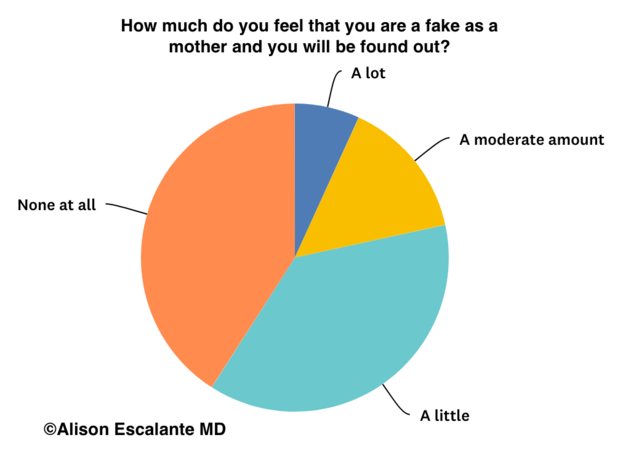Parenting
Do You Have Mompostor Syndrome?
The culture of intensive parenting encourages mothers to feel like impostors.
Posted October 17, 2019 Reviewed by Hara Estroff Marano
Thirty-five years have passed since Dr. Pauline Rose Clance first highlighted motherhood as a trigger for the Impostor Phenomenon, and the culture of parenting has only gotten more stressful. In the 1980s, Dr. Clance also described the message that dysfunctional families give their kids and how that creates impostor feelings. But now, driven by today’s intensive parenting, our culture of criticism sends the same messages to parents. Mothers feel like Mompostors.
Mothers who can never measure up.
Now that child-rearing is an all-consuming task where even small failures are not an option, parents (particularly mothers) are showing record-high levels of stress. There is so much that parents are told they should and should not do for their children, and the only standard is perfection. In this ShouldStorm of parenting, it makes sense that parents would exhibit features of the Impostor Phenomenon.
In her 1985 book, Dr. Clance wrote about constantly seeing successful men and women in her practice who were “miserable because in their eyes they never measure up. They believe they are never as bright or as talented or as sharp as others in their fields. They believe their success has come from every reason in the world except the real one: they had the ability and the brains.”
Today, I constantly see wonderful mothers in my pediatric office who are miserable because in their eyes they never measure up. They believe they are never as patient or as wise or as loving or as devoted to enriching their children as the other mothers around them. They believe that their children are doing well for every reason in the world except the real one: that they are loving mothers who are doing enough for their children.
People with IP “experienced a haunting fear that they could not continue repeating their successes and that they were not as bright and as capable as they needed or wanted to be.” Substitute words like loving or skillful as a parent, and you’ve got today’s motherhood experience.
Mompostor Syndrome
When I spoke with Dr. Clance, she explained the connection between impostor feelings and mothers. “I think it is hard, because the mother feels so responsible, and wants to do the job so very well, you know, perfectly. In terms of the impostor phenomenon, it's feeling like ‘I can't be good enough,’ ‘I'm not good enough,’ ‘even though I do all these things for my child, I am somehow failing.’”
Her colleague, Dr. Suzann Lawry, faculty at Georgia State University, explained that suffering from Impostor Phenomenon means “you’re an objectively successful person, but you’re not able to integrate the data of your life. It’s a way of throwing away the information, so ‘I’m successful, but it’s because I’ve worked really really hard at it, and most moms wouldn’t have to work at it this hard at it. They would just do it.’ Or ‘I’m lucky that I just happened to do it right this time.’”
Mompostors suffer, because they carry a shameful secret: they believe they are not good mothers. But how can this be? And it doesn’t help to tell Mompostors they are doing well, because people with IP cannot accept even truthful praise. They are sure isn’t true. In fact, praise actually makes them feel worse. “See,” says the Mompostor to herself, “I’m so good at faking, people actually can’t see the truth that I am an incompetent mother.”
Mothers report feeling like Mompostors.
According to Dr. Lawry, 25-30% of high achievers experience impostor feelings. When I surveyed a group of high achieving mothers on social media, about 50% showed impostor feelings around their mothering. 78% of them felt strongly they had to consistently get it right and a heartbreaking 58% felt disappointed with what they’d done for their kids and felt they should have done much more.
In response to the question: “How much do you feel that you are a fake as a mother and you will be found out?” only 21% of mothers who responded attested to feeling this at least a moderate amount. Yet, another 38% said they felt that way a little. Take a moment to consider that. More than half of mothers actually felt like a fake as a mother, at least sometimes. That’s startling. How can you be a fake as a mother, if you love your child?

Is our culture encouraging Mompostor feelings?
Dr. Clance has observed that families can give two types of messages that created impostor feelings in their children. The first group of parents was hyper-critical, commenting only on their children’s mistakes. The second group of parents was the over-praisers, giving vague general praise like “you are the smartest kid in the world,” without specific content.
“Oh yes,” said Dr. Clance, “I worked with some brilliant kids and could see how much they wanted to please their parents and to feel their parents were proud. And then the parent says, ‘Oh, you can do anything in the world you want to,’ which isn't true. I mean, they can do many things. But there are some things they have trouble with. Those brilliant kids can't always do it all, and then they feel shame. They think, 'My parents think I can do all this, but I can’t, and I don't want them to know, that I made a B, instead of an A.’”
I observed that our culture now sends a confusing mixture of these two types of messages. Moms get lots of vague over-praise like: “You're a wonderful mother,” “You’re great,” and “You deserve to treat yourself.” But then, mothers are shamed by family, neighbors, online or by strangers in public for the tiniest things. It seems inevitable that this combination will make us feel like Mompostors.
“Yes, I think that’s right,” Dr. Clance observed when I explained my ideas, “and I think it’s getting worse. ”
In my next article, I’ll look at how we can raise our kids free of impostor phenomenon.
References
Clance, Pauline Rose. (1985) The Impostor Phenomenon: Overcoming the Fear That Haunts Your Success. Peachtree Pub Ltd.




